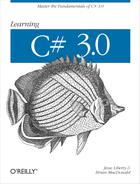In the previous example, you subscribed to the event by invoking a new instance of the delegate, passing in the name of a method that implements the event:
theClock.SecondChanged += new Clock.SecondChangeHandler(TimeHasChanged);
You can also assign this delegate by writing the shortened version:
theClock.SecondChanged += TimeHasChanged;
Later in the code, you must define TimeHasChanged as a method that matches the signature of the SecondChangeHandler delegate:
public void TimeHasChanged(object theClock, TimeInfoEventArgs ti)
{
Console.WriteLine("Current Time: {0}:{1}:{2}",
ti.hour.ToString( ), ti.minute.ToString( ), ti.second.ToString( ));
}Anonymous methods allow you to pass a code block rather than the name of the method. This can make for code that is more efficient and easier to maintain, and the anonymous method has access to the variables in the scope in which they are defined.
clock.SecondChanged += delegate( object theClock, TimeInfoEventArgs ti )
{
Console.WriteLine( "Current Time: {0}:{1}:{2}",
ti.hour.ToString( ), ti.minute.ToString( ), ti.second.ToString( ) );
};Notice that rather than registering an instance of a delegate, you use the keyword delegate, followed by the parameters that would be passed to your method, followed by the body of your method encased in braces and terminated by a semicolon.
This method has no name; hence, it is anonymous. You cannot invoke the method except through the delegate; but that is exactly what you want.
